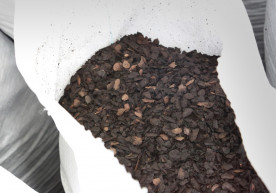The bark is stripped off the logs through a mechanical debarking process before the sawmilling process begins and thus becomes a by-product of the sawmilling operation. As a process of managing our by-products, the bark is aged (composted) over a period of time before it is sold a growing medium.
The aging (composting) process is simple but time consuming and can last up to 18 to 24 months. It involves stacking the bark in large windrows, adding water and turning the stacks regularly. The water helps to leach out the harmful tannins and the turning aerates the stack to assist in the composting process. Monitoring of the stack temperatures ensures the stacks are actively breaking down to form a quality multi-purpose growing medium.
Currently no chemicals are added during this process. If the need arises to speed up the process then fertilizer Urea may be added.
Once fully composted, the growing medium is ready for sale to the market for use as a growing medium or mulch product.
The fully aged (composted) medium is then either sold in its composted un-sifted form or it is sifted into three products categorised by the particle size:
- Seeding Mix/Potting Soil
- Potting Mulch/Berry Mix
- Garden Mulch, No 4
- Garden Mulch, No 5
- Composted/Un-sifted
- Raw Bark
The most popular product for hydroponic tunnels is the composted but un-sifted medium consisting of all of the above sizes and bigger. Approximately 80% of the volume is 25mm and smaller. This has an excellent consistency to retain the right amount of water required by the plant and to hold the root structure firmly.
Customers using this product have recorded savings on water and fertilisers as compared to other growing mediums options such as shavings.
The Envirogro products have been successfully used to grow a wide range of seedlings, flowers and vegetables in hydroponic tunnels; namely, various vegetable seedlings, pine seedlings, eucalyptus seedlings, many flowers such as roses and vegetables and fruits including tomatoes, peppers, lettuce, blueberries, strawberries and mushrooms.










